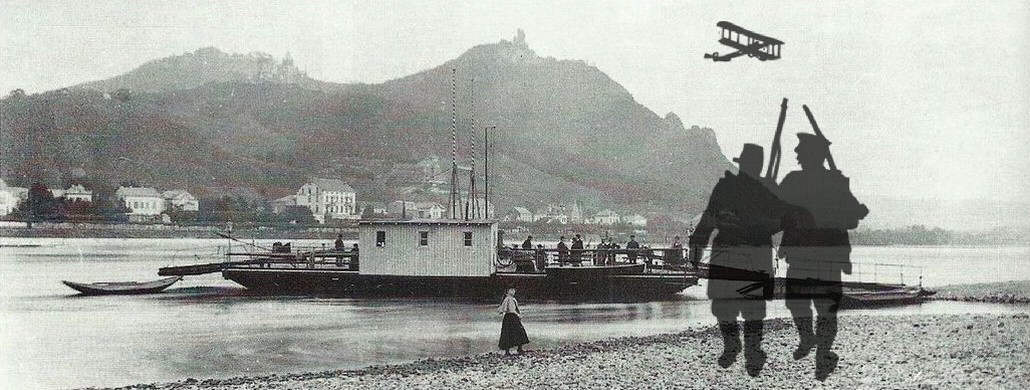
[Rhineland, 1918] For most Germans, the defeat had come as a surprise. Until the end, the war propaganda had promised victory, Now Allied soldiers would march into the Rhineland. Martial law still prevailed.
Still, German troops were in France and Belgium, there had been no fighting on German soil … now Allied troops would soon occupy the left bank and bridgeheads at Cologne, Coblenz, and Mainz. A 50 km wide strip along the Rhine on the right bank had been declared a demilitarized zone.
Retreat
According to the terms of the armistice, the left bank of the Rhine had to be cleared by 6 a.m. on December 4, or so the newspapers had reported. Therefore, the ferry had day and night shifts to transport people and material from the left to the right bank of the Rhine. The ships of the Köln-Düsseldorfer and other companies also helped tirelessly. At the south end of Königswinter and in Niederdollendorf, pioneer battalions had built pontoon bridges across the Rhine.
The villages Königswinter and Dollendorf on the Rhine seemed to be army camps in these days. Lottie, Kathi and as fast as he could also Jakob were hurrying around to help bring warm beverages to all these people. Everyone was doing their best to find quarters for the soldiers. Despite the defeat, people had decorated the streets with garlands and flags, to give the troops a friendly welcome after the devastating war experiences.
Jakob felt with Erzberger and had forebodings. He knew about the terrible destructions in France and Belgium and the atrocities committed. Great Britain’s and above all France’s conditions for peace would go far beyond Wilson’s Fourteen Points. “Poison gas, bombs, and torpedoes against civilians, entire regions blasted into oblivion. Erzberger has to face the Allies hatred now, not the Kaiser’s generals who ordered these crimes.”
Uncertainty about the future
Some days later, Lottie stood at the banks of the Rhine and looked over. There, on the other side of the Rhine, was now foreign or occupied territory. The pontoon bridges across the Rhine had already been dismantled.
She thought of her uncle Hans and Susan’s husband Étienne, both had been shot dead four years ago when they tried to put their beloved Rhine steamer “Aimée” in the service of the Red Cross. Lottie did not know what had become of the ship. She also thought of her fellow winemakers on the left bank of the Rhine. All the wine-growing areas over there were now occupied by the French, Alsace-Lorraine was French territory again.
Much to her regret, France and Germany had often been hostile neighbors. She had grown up in another tradition. Her grandfather Jean and her uncle Hans had been captains on the Rhine, both had loved the mighty old river who should make friends of the people on his shores, not enemies. After the Franco-Prussian War 1870/71 and the annexation of Alsace-Lorraine, the Bergmann family had strived to support and make friends with the fellow winemakers over there. Now France and Germany seemed irreconcilable enemies.
Will France annex the Rhineland?
Rumor had it that the French government was planning to annex the Rhineland. To many Rhinelanders this was a real danger, and as early as November 10, 1918, one day before the armistice, the “Cologne Volkszeitung,” an organ of the Catholic Center Party, launched a campaign for a Rhineland republic within the framework of the German Reich. Lottie did not believe that a neutral Rhenish buffer state alone could solve all the problems. Belgium’s neutrality had not protected it from being invaded and devastated.
With its close geographic and cultural proximity to Western Europe, a strong Rhenish state within the German Reich could bring together France and Belgium and the eastern parts of Germany – but only if the former enemies found a way to cooperate again, and that would occur only in the far distance, if ever.
Occupation by British and Canadian soldiers
Some 10,000 British and Canadian soldiers stood in Bonn. On December 6th, the first British soldiers arrived in Cologne, by December 15 the whole Cologne area was under British occupation. It was switched to British time, so in Cologne it was an hour earlier than in the rest of Germany. Freedom of press and assembly were restricted, nightly curfews imposed, and carnival was forbidden. Many families had to provide accommodation for English soldiers. Soon Mayor Konrad Adenauer established good working relationships with the British military authorities, and both sides got along quite well.
The frontier of the Cologne bridgehead on the left side passed right through their county, the Siegkreis. Some villages belonged to the Cologne bridgehead, others were disputed and no one was sure. Königswinter, like Honnef and Linz, was to be a neutral zone. However, on December 12, British and Canadian troops marched into town. They requested quarters in different hotels, also the hotel on the Petersberg had to provide beds. Germany appealed to the armistice commission in Trier and got her right. Before Christmas, the Canadians would withdraw.
“What a sad advent,” Lottie thought. The war was over, but not for the people here on the Rhine, and not for the occupation soldiers from far away either.

Be the first to comment